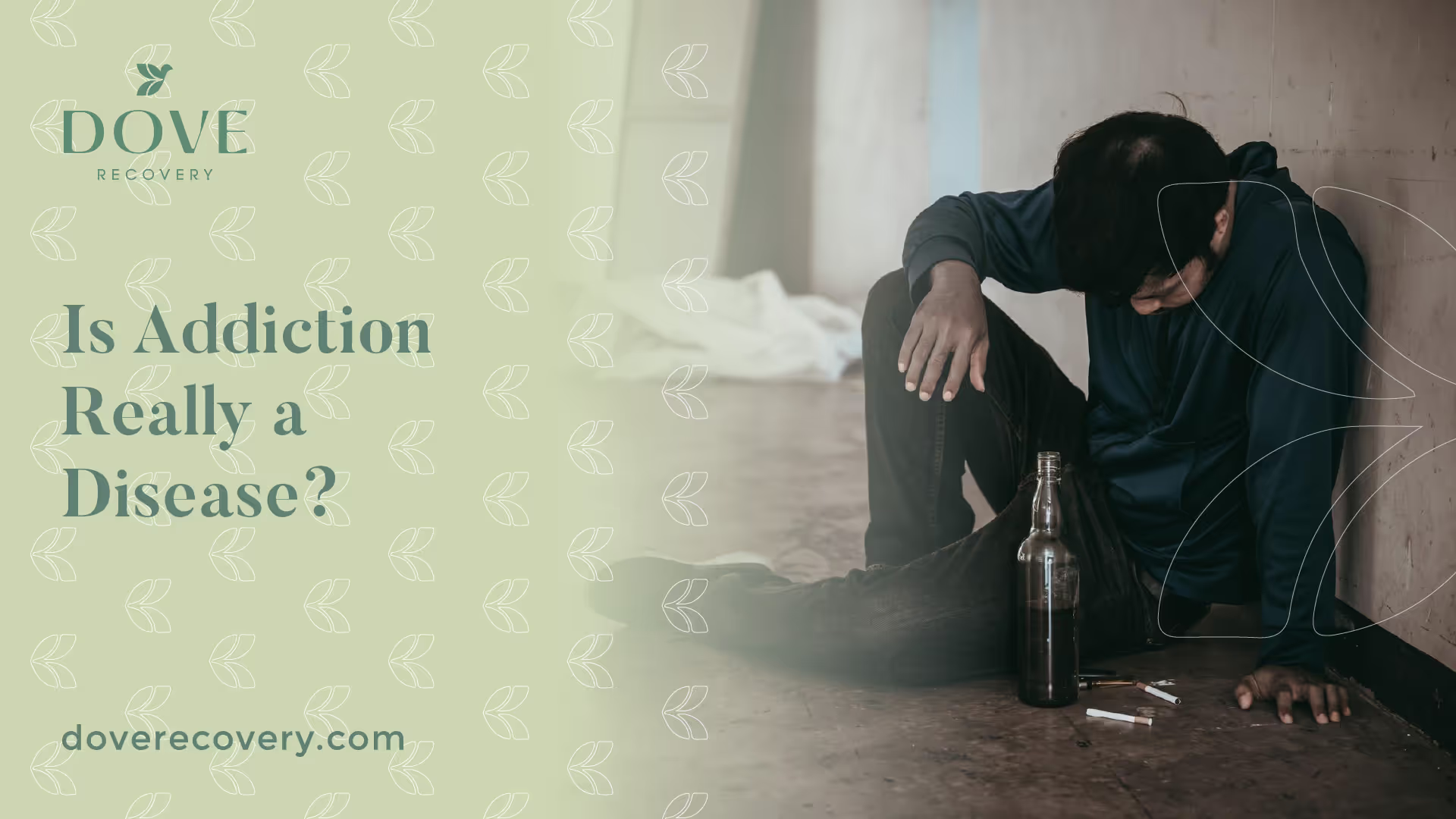Is Addiction Really a Disease?

The Traditional View of Addiction
When examining the topic of addiction, it is important to understand the traditional view that has long characterized addiction as a disease. This perspective considers addiction to be a complex condition that requires medical intervention and treatment. In this section, we will provide an overview of addiction as a disease and explore the medical model that supports this view.

Addiction as a Disease: An Overview
Addiction is often described as a chronic, relapsing brain disorder that impacts an individual's behavior and overall well-being. It is characterized by compulsive drug use or engagement in activities despite negative consequences. The traditional view of addiction as a disease emphasizes that it is not simply a moral failing or lack of willpower, but rather a result of underlying physiological and psychological processes.
The disease model of addiction posits that addiction is caused by changes in the brain's structure and function, leading to a loss of control over substance use or certain behaviors. It suggests that addiction is similar to other chronic diseases, such as diabetes or heart disease, which require ongoing management and treatment.
The Medical Model of Addiction
The medical model of addiction is closely aligned with the disease model and is based on the understanding that addiction is a medical condition that can be diagnosed and treated. It emphasizes the role of genetics, neurobiology, and environmental factors in the development of addiction.
According to the medical model, addiction is characterized by changes in the brain's reward system, which involve neurotransmitters such as dopamine. These changes lead to the intense cravings and compulsive behaviors commonly seen in individuals with addiction. Additionally, the medical model recognizes that addiction can co-occur with mental health disorders, such as anxiety or depression. Understanding the connection between addiction and mental health is crucial for providing comprehensive treatment.
Treatment approaches based on the medical model often involve a combination of medication, therapy, and support systems. Addiction recovery programs and rehab centers play a vital role in providing evidence-based treatments and helping individuals navigate their journey towards recovery.
While the traditional view of addiction as a disease has been widely accepted, it is important to explore alternative perspectives and consider their implications. In the following sections, we will examine different models of addiction and the evidence that supports them.
Rethinking Addiction
While the traditional view of addiction portrays it as a disease, alternative perspectives have emerged challenging this notion. These alternative perspectives offer valuable insights into the complex nature of addiction and provide a more comprehensive understanding of this phenomenon.
Alternative Perspectives on Addiction
One alternative perspective on addiction suggests that it is not solely a disease but rather a complex interplay of various factors. This perspective emphasizes the role of psychological, social, and environmental factors in influencing addictive behaviors. According to this view, addiction can be seen as a response to underlying psychological issues, such as trauma, stress, or mental health disorders. Additionally, socio-cultural factors, such as peer influence, societal norms, and economic disparities, can also contribute to the development of addictive behaviors.
By exploring these alternative perspectives, it becomes clear that addiction is not solely a result of physiological processes but rather a multifaceted issue with various underlying causes. Understanding addiction from these alternative viewpoints helps to provide a more holistic approach to prevention and treatment.
Criticisms of the Disease Model
While the disease model of addiction has been widely accepted, it has faced criticisms from alternative perspectives. One criticism is that labeling addiction as a disease can potentially lead to stigmatization and helplessness. When addiction is viewed solely as a disease, individuals struggling with addiction may perceive themselves as powerless victims, which can hinder their motivation to seek help and make positive changes.
Additionally, critics argue that the disease model may overlook the importance of personal agency and responsibility in addiction. By focusing solely on the disease aspect, the model may undermine the individual's ability to take control of their behaviors and make positive choices. Recognizing personal agency and responsibility is crucial in empowering individuals to overcome addiction.
By critically examining the disease model of addiction and considering alternative perspectives, we can foster a more comprehensive understanding of addiction and explore innovative approaches to prevention and treatment.
The Disease Model vs. Other Models
When it comes to understanding addiction, various models have been proposed to explain its nature and causes. The traditional disease model is just one perspective among several others, including psychological models and socio-cultural models.
Psychological Models of Addiction
Psychological models of addiction focus on the individual's thoughts, emotions, and behaviors as key factors contributing to addiction. These models suggest that underlying psychological processes, such as coping mechanisms, self-esteem issues, or unresolved trauma, play a significant role in the development and maintenance of addictive behaviors.
Psychological models highlight the importance of understanding the individual's unique experiences and mental health conditions that may co-occur with addiction. For instance, individuals struggling with addiction may also face mental health challenges. The relationship between addiction and mental health is complex and intertwined.
Socio-cultural Models of Addiction
Socio-cultural models of addiction emphasize the influence of social and cultural factors on addiction. These models recognize that addiction can be shaped by the environment, social norms, and cultural values. They highlight how socio-economic disparities, peer pressure, family dynamics, and societal expectations can contribute to the development of addictive behaviors.
Understanding addiction from a socio-cultural perspective helps shed light on the contextual factors that influence substance use and misuse. It acknowledges that addiction cannot be solely attributed to individual choices but is also influenced by broader social structures and systems.
By considering both psychological and socio-cultural models, we can gain a more comprehensive understanding of addiction. These models complement the disease model by addressing the complex interplay between individual psychology, social factors, and cultural contexts. It is important to note that these models are not mutually exclusive, and multiple factors can contribute to addiction.
To explore this topic further, let's move on to the evidence supporting these different models. We'll delve into the concepts of neuroplasticity and personal agency in relation to addiction.
The Evidence
When considering the nature of addiction, it is important to examine the evidence that challenges the traditional view of addiction as a disease. Two key areas of evidence that have sparked debate are neuroplasticity and the concepts of personal agency and responsibility.
Neuroplasticity and Addiction
Neuroplasticity refers to the brain's ability to change and adapt throughout a person's life. Research in this area has revealed that addiction can lead to significant changes in the brain's structure and function. These changes can impact decision-making, impulse control, and reward processing, which are all central to addictive behavior.
Studies have shown that repeated exposure to addictive substances or behaviors can result in alterations in the brain's reward pathway, leading to a heightened desire for the substance or behavior. These changes can persist even after the immediate effects of the substance have worn off, contributing to cravings and relapse.
Understanding the role of neuroplasticity in addiction provides valuable insights into how the brain adapts to addictive substances or behaviors. It challenges the notion that addiction is solely a result of a disease process and highlights the complex interplay between brain chemistry, behavior, and environmental factors.
Personal Agency and Responsibility
Another aspect that challenges the disease model of addiction is the concept of personal agency and responsibility. Critics argue that labeling addiction as a disease can undermine an individual's sense of control and personal responsibility. They emphasize the importance of recognizing that individuals have the capacity to make choices and exert control over their behavior.
While addiction can significantly impact an individual's ability to regulate their behavior, it is essential to acknowledge that individuals still possess a degree of agency. Many people with addiction have successfully overcome their substance use disorders through various forms of treatment and support.
Recognizing personal agency and responsibility does not negate the need for compassion and understanding. It simply acknowledges that individuals can play an active role in their own recovery.
By examining the evidence surrounding neuroplasticity and personal agency, we can challenge the traditional view of addiction as solely a disease. This broader perspective encourages a more comprehensive understanding of addiction, considering the interplay between biological, psychological, and social factors. It also opens up possibilities for new approaches to treatment and support that integrate multiple perspectives.
Implications and Treatment Approaches
As our understanding of addiction evolves, so too do the implications for treatment approaches. Challenging the traditional view of addiction as a disease opens up new possibilities for shifting paradigms and integrating multiple perspectives in addiction treatment.
Shifting Paradigms in Addiction Treatment
Rethinking addiction as more than just a disease has significant implications for how we approach treatment. Instead of solely focusing on the medical model, which often emphasizes the role of genetics and neurobiology, there is a growing recognition of the importance of psychological and socio-cultural factors in addiction.
Treatment approaches are now shifting towards a more holistic perspective, considering the complex interplay between biological, psychological, and social factors. This broader view allows for a more comprehensive understanding of addiction and opens up avenues for personalized, multidimensional treatment plans.
Integrating different therapeutic modalities and approaches has shown promise in addressing the various facets of addiction. For example, incorporating cognitive-behavioral therapy to address underlying psychological factors, family therapy to address socio-cultural dynamics, and support groups to foster a sense of community and shared experiences. By adopting a multidimensional approach, treatment can be tailored to the unique needs of individuals struggling with addiction.
Integrating Multiple Perspectives
Recognizing that addiction is influenced by a combination of factors, it becomes crucial to integrate multiple perspectives in the treatment process. This includes considering the biological, psychological, and socio-cultural aspects of addiction.
In the realm of biological factors, understanding the role of neurotransmitters, such as dopamine, in addiction can inform treatment approaches that target these specific pathways.
Psychological factors play a significant role in addiction, and therapy approaches that address underlying emotional trauma, mental health conditions, and maladaptive coping mechanisms can be beneficial.
Socio-cultural factors also shape addiction, with influences such as peer pressure, environmental stressors, and social norms. Incorporating socio-cultural perspectives in treatment can involve family involvement, community support, and addressing the broader societal factors that contribute to addiction.
By considering these various perspectives and tailoring treatment plans accordingly, individuals with addiction can receive comprehensive care that addresses the multifaceted nature of their condition. This integrated approach recognizes the uniqueness of each individual's journey and acknowledges the importance of personal agency and responsibility in the recovery process.
In conclusion, challenging the traditional view of addiction as a disease has led to a paradigm shift in addiction treatment. By shifting the focus towards a more holistic view and integrating multiple perspectives, treatment approaches can be more comprehensive, personalized, and effective in supporting individuals on their path to recovery.
Conclusion
While there is no denying that addiction is a complex issue, it is important to remember that the road to recovery is not a one-size-fits-all approach. Each individual's journey is unique and requires a personalized treatment plan that addresses their specific needs. By embracing a multidimensional view of addiction and integrating various perspectives, we can provide individuals with the support and resources they need to overcome addiction and lead fulfilling lives.
